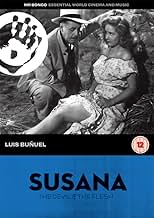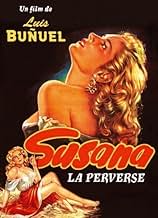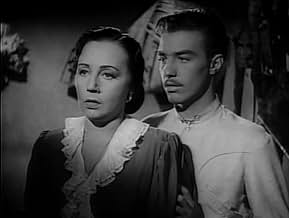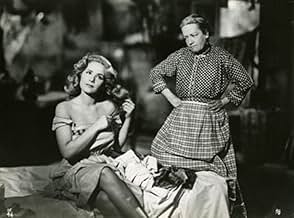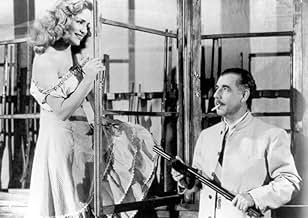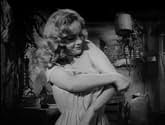VALUTAZIONE IMDb
7,2/10
2381
LA TUA VALUTAZIONE
Una giovane donna fugge dal riformatorio e rimane nella casa di una famiglia ricca e rispettabile. A poco a poco, provoca discordie tra i membri della famiglia fino a quando non torna in car... Leggi tuttoUna giovane donna fugge dal riformatorio e rimane nella casa di una famiglia ricca e rispettabile. A poco a poco, provoca discordie tra i membri della famiglia fino a quando non torna in carcere.Una giovane donna fugge dal riformatorio e rimane nella casa di una famiglia ricca e rispettabile. A poco a poco, provoca discordie tra i membri della famiglia fino a quando non torna in carcere.
- Regia
- Sceneggiatura
- Star
- Premi
- 1 candidatura in totale
Jesús García
- Empleado de Guadalupe
- (non citato nei titoli originali)
Leonor Gómez
- Empleada de Guadalupe
- (non citato nei titoli originali)
Recensioni in evidenza
Buñuel's fifth feature, a small-budgeted moral parable made in Mexico, almost exclusively confined in the hacienda of a middle-class rancher owner Don Guadalupe (Soler). In an unusual tempest night, a sultry young woman Susana (Quintana) escapes from a reformatory and winds up at his doorstep, she is taken in by the kind-hearted matriarch Doña Carmen (Palou), Guadalupe's wife, as a domestic help. But soon the seemingly perfect family will disintegrate from inside when Don Guadalupe, his adolescent son Alberto (Somoza) and the masculine ranch helper Jesús (Mendoza) are all attracted to Susana's sex appeal, only the God-fearing maid Felisa (Arcos) sees through her innocuous front, but who can save the family from the ultimate rupture in the climax? Only Buñuel's deus ex machina.
In fact, the movie itself is grounded on a surreal precondition, in the opening scenes, Susana is locked up in a solitary cell, she entreats God in front of a cross materialised by the shadows of the metal bars, to give her a way out since she can not change her nature, which is made by God himself, so God grants her wish, as if he wants to cast a prank on us, releases the snake into the Garden of Eden. The script runs formulaic-ally where three different types of men all become the victims of Susana's seduction, Rosita Quintana successful captures her carnal allure with crude histrionics, for the spunky Jesús, she is the unattainable wench who promises him something sweet but refuses his pushing courtship; for the bookish Alberto, she is a proactive seductress from whom he is too green to resist, and for the patrician Guadalupe, she becomes a damsel in distress, who inadvertently rekindles his sexual urge which a married middle-age man can no longer obtain from his wife. While men are succumbing to their primitive lust, after seeing through her veiled pretence, Carmen and Felisa strike up, only that would be too late if Buñuel had opted for a more sinister finale.
The happy ending is a policy of appeasement, even the mare miraculously regains its vitality, but the re-gained conformity and harmony appear so ironic thanks to Buñuel's poker-faced mockery - how simple a weed in the field can bring about moral corruption to a conventional middle-class family. SUSANA is a fetching microcosm of Buñuel's views on human frailties, unambitious, simple but integral and surprisingly gratifying.
In fact, the movie itself is grounded on a surreal precondition, in the opening scenes, Susana is locked up in a solitary cell, she entreats God in front of a cross materialised by the shadows of the metal bars, to give her a way out since she can not change her nature, which is made by God himself, so God grants her wish, as if he wants to cast a prank on us, releases the snake into the Garden of Eden. The script runs formulaic-ally where three different types of men all become the victims of Susana's seduction, Rosita Quintana successful captures her carnal allure with crude histrionics, for the spunky Jesús, she is the unattainable wench who promises him something sweet but refuses his pushing courtship; for the bookish Alberto, she is a proactive seductress from whom he is too green to resist, and for the patrician Guadalupe, she becomes a damsel in distress, who inadvertently rekindles his sexual urge which a married middle-age man can no longer obtain from his wife. While men are succumbing to their primitive lust, after seeing through her veiled pretence, Carmen and Felisa strike up, only that would be too late if Buñuel had opted for a more sinister finale.
The happy ending is a policy of appeasement, even the mare miraculously regains its vitality, but the re-gained conformity and harmony appear so ironic thanks to Buñuel's poker-faced mockery - how simple a weed in the field can bring about moral corruption to a conventional middle-class family. SUSANA is a fetching microcosm of Buñuel's views on human frailties, unambitious, simple but integral and surprisingly gratifying.
Susana (1951)
** 1/2 (out of 4)
Bunuel's remake of the 1929 American film The Squall centers on Susana (Rosita Quintana), a mentally unstable woman, who escaped from a reformatory and gets shelter from a kind and caring family. Pretty soon Susana is turning on the sexuality and starts to make the family turn against one another. The original movie is perhaps the worst Hollywood film I've seen from that era so it didn't take too much for this movie to pace it up. With that said, I think overall this is a pretty disappointing film from the director but I'm really not sure if he could have done anything different to make it better. To me, this story just doesn't work because it's just so over dramatic that you can't help but role you eyes at all the "tragedy" that befalls the people around Susana. The only thing this movie tells you that men are dumb and can be changed due to a woman's sexuality. This really isn't too dramatic and in the end the movie begins to drag. Another problem I had with the film is that the characters were all pretty annoying and that includes the old aunt who is constantly screaming religious sayings. I'm not sure if Bunuel made her so over the top for laughs or if this was just his way to go against Christians. Even with all that said this is still a beautiful film to look at with some great cinematography. The performances are also good but I was expecting better considering the director. Quintana is great and really steals the film as she plays the innocent virgin to trick the family very well and on the blink of a dime she can turn into the slut. Fernando Soler is also very good as the head man of the home.
** 1/2 (out of 4)
Bunuel's remake of the 1929 American film The Squall centers on Susana (Rosita Quintana), a mentally unstable woman, who escaped from a reformatory and gets shelter from a kind and caring family. Pretty soon Susana is turning on the sexuality and starts to make the family turn against one another. The original movie is perhaps the worst Hollywood film I've seen from that era so it didn't take too much for this movie to pace it up. With that said, I think overall this is a pretty disappointing film from the director but I'm really not sure if he could have done anything different to make it better. To me, this story just doesn't work because it's just so over dramatic that you can't help but role you eyes at all the "tragedy" that befalls the people around Susana. The only thing this movie tells you that men are dumb and can be changed due to a woman's sexuality. This really isn't too dramatic and in the end the movie begins to drag. Another problem I had with the film is that the characters were all pretty annoying and that includes the old aunt who is constantly screaming religious sayings. I'm not sure if Bunuel made her so over the top for laughs or if this was just his way to go against Christians. Even with all that said this is still a beautiful film to look at with some great cinematography. The performances are also good but I was expecting better considering the director. Quintana is great and really steals the film as she plays the innocent virgin to trick the family very well and on the blink of a dime she can turn into the slut. Fernando Soler is also very good as the head man of the home.
This is a slight comedy-drama from Bunuel's Mexican phase, though the seductive, curvy and funny Rosita Quintana is certainly well-cast as an unscrupulous home-wrecker. The only ironic Bunuel touch I could spot was making the most Christian character also the most hateful and nasty; maybe viewers more experienced in the director's work will find more! **1/2 out of 4.
Even as a "minor" work, I was a little surprised to find out that Luis Bunuel didn't care very much for the experience or final product of Susana (aka Devil in the Flesh). It is, I'll admit, not something I would rush out to tell my fellow Bunuel friends to see; part of that is practical, since it's only available on a VHS from the mid-80s and isn't in great condition even if found, but the other part is that it takes a real fan to appreciate it as a Bunuel film. Like Robinson Crusoe to an extent, though I think here more-so, it relies a bit for the audience member to understand what it is that attracted the great surrealist to the project. Temptation, pure and simple: this is at its best a story that allowed for the filmmaker to bask in a long-favored pastime, which was ticking off the uptight religious fanatics and purists who couldn't stand to see any kind of sensuality on the screen.
Sure, it definitely pales in comparison to the desire and temptation on parade and blasting at 11 in Un Chien Andalou or Viridiana. That's because Bunuel is keeping it on the down-low, which has its advantages and sort of disadvantages. On its own Susana is simply a melodrama, a story of this girl Susana (beautiful and talented if two-note Rosita Quintana) who escapes in one of those fun Bunuelian twists from a mental asylum to wind up on a rainy night in the care of a pretty religious farmhouse. She fits in with the chores and such, but also does her best to tempt the prudish on the farm (when she's asked to cover up she does, until no one's looking relatively), but winds up in a real pickle when tempting the wrong man.
And, on its own terms, it's a pretty decent melodrama. Some good performances, a few very good scenes of dialog and tension, but also on the scale of a very good soap opera all the same. I can see where Bunuel might have had some tension during the making; it feels and is a studio production, and as such he had to stay well within the limitations of the subject matter and low-budget. But it is worth seeing because it is still a Bunuel picture, with moments like that scene at night where the two men look on, tongues practically dangling out of their mouths, watching as Susana simply brushes her hair in silhouette, or a few moments where the twisted humor ratchets up a notch or too (it's rare, but worth it, if only in the unintended or just dated "scandalous" nature of the content). It's safe stuff coming from the director of the Phantom of Liberty, but it's not at all a bad movie either.
Sure, it definitely pales in comparison to the desire and temptation on parade and blasting at 11 in Un Chien Andalou or Viridiana. That's because Bunuel is keeping it on the down-low, which has its advantages and sort of disadvantages. On its own Susana is simply a melodrama, a story of this girl Susana (beautiful and talented if two-note Rosita Quintana) who escapes in one of those fun Bunuelian twists from a mental asylum to wind up on a rainy night in the care of a pretty religious farmhouse. She fits in with the chores and such, but also does her best to tempt the prudish on the farm (when she's asked to cover up she does, until no one's looking relatively), but winds up in a real pickle when tempting the wrong man.
And, on its own terms, it's a pretty decent melodrama. Some good performances, a few very good scenes of dialog and tension, but also on the scale of a very good soap opera all the same. I can see where Bunuel might have had some tension during the making; it feels and is a studio production, and as such he had to stay well within the limitations of the subject matter and low-budget. But it is worth seeing because it is still a Bunuel picture, with moments like that scene at night where the two men look on, tongues practically dangling out of their mouths, watching as Susana simply brushes her hair in silhouette, or a few moments where the twisted humor ratchets up a notch or too (it's rare, but worth it, if only in the unintended or just dated "scandalous" nature of the content). It's safe stuff coming from the director of the Phantom of Liberty, but it's not at all a bad movie either.
Susana is a fallen girl. At the beginning we see her in a reformatory, but the reasons that brought her there remain in the dark. We just find out that she has learned nothing new in the two years she has spent there and that she behaves in the same unruly and rebellious way like when she was first admitted to the place.
She is brought into a dark and sinister cave which is teeming with rats and spiders. We know nothing about the reasons for this punishment and we can't avoid feeling sorry for her: Whatever she might have done, it does not justify an inhuman treatment such as this.
Susana is religious, and the god she calls on is kind and generous. So the miracle happens, the bars of the prison cell at which she is rattling suddenly give way and she succeeds in escaping into a night full of darkness and relentless rain.
She even can make it into paradise: A landowner's family takes her in, after she has told them a pack of lies. She is allowed to work as a maid and gains the confidence and the affection of the mother, while the father at first has a disapproving attitude towards her.
But the family's son and the steward live on the estate, too, and they don't fail to notice Susana's outstanding physical attraction. As the girl also knows how to place her charms, they both fall victim to her.
Susana, however, does not seem capable of developing any true feelings. Life is just a villainous game for her in which the rules are set by herself. The aim is to destroy the well established order. When finally even the landowner succumbs to the lure of love the initial situation becomes reversed and nothing stays the same: the mother turns into an enraged enemy, while father and son become rivals and the steward is dismissed.
It is then the latter who sets the decisive ball rolling which leads once more to a reversal of the circumstances: He finally makes use of his knowledge of Susana's escape from the reformatory, which up to now he kept to himself in order to increase his chances of winning Susana's favor, and Susana, however fiercely she may be defending herself, cannot avoid being arrested.
The game is lost, and, as it often happens in a melodrama, it is the refused lover, who makes it break down. In the end, the episode with Susana means nothing more than the memory of a nightmare for the landowner's family. And, after the re-establishment of the initial situation, the characters cannot help asking themselves if everything has really happened.
The attentive spectator will come to a different conclusion. He will notice the fundamental fragility of an order that is well established only in appearance. And he will not be able to avoid drawing a frightful parallel to his own life, in which nothing is secure and reliable either.
She is brought into a dark and sinister cave which is teeming with rats and spiders. We know nothing about the reasons for this punishment and we can't avoid feeling sorry for her: Whatever she might have done, it does not justify an inhuman treatment such as this.
Susana is religious, and the god she calls on is kind and generous. So the miracle happens, the bars of the prison cell at which she is rattling suddenly give way and she succeeds in escaping into a night full of darkness and relentless rain.
She even can make it into paradise: A landowner's family takes her in, after she has told them a pack of lies. She is allowed to work as a maid and gains the confidence and the affection of the mother, while the father at first has a disapproving attitude towards her.
But the family's son and the steward live on the estate, too, and they don't fail to notice Susana's outstanding physical attraction. As the girl also knows how to place her charms, they both fall victim to her.
Susana, however, does not seem capable of developing any true feelings. Life is just a villainous game for her in which the rules are set by herself. The aim is to destroy the well established order. When finally even the landowner succumbs to the lure of love the initial situation becomes reversed and nothing stays the same: the mother turns into an enraged enemy, while father and son become rivals and the steward is dismissed.
It is then the latter who sets the decisive ball rolling which leads once more to a reversal of the circumstances: He finally makes use of his knowledge of Susana's escape from the reformatory, which up to now he kept to himself in order to increase his chances of winning Susana's favor, and Susana, however fiercely she may be defending herself, cannot avoid being arrested.
The game is lost, and, as it often happens in a melodrama, it is the refused lover, who makes it break down. In the end, the episode with Susana means nothing more than the memory of a nightmare for the landowner's family. And, after the re-establishment of the initial situation, the characters cannot help asking themselves if everything has really happened.
The attentive spectator will come to a different conclusion. He will notice the fundamental fragility of an order that is well established only in appearance. And he will not be able to avoid drawing a frightful parallel to his own life, in which nothing is secure and reliable either.
Lo sapevi?
I più visti
Accedi per valutare e creare un elenco di titoli salvati per ottenere consigli personalizzati
- How long is Susana?Powered by Alexa
Dettagli
- Data di uscita
- Paese di origine
- Sito ufficiale
- Lingua
- Celebre anche come
- Susana
- Luoghi delle riprese
- Aziende produttrici
- Vedi altri crediti dell’azienda su IMDbPro
- Tempo di esecuzione1 ora 26 minuti
- Colore
- Proporzioni
- 1.37 : 1
Contribuisci a questa pagina
Suggerisci una modifica o aggiungi i contenuti mancanti


